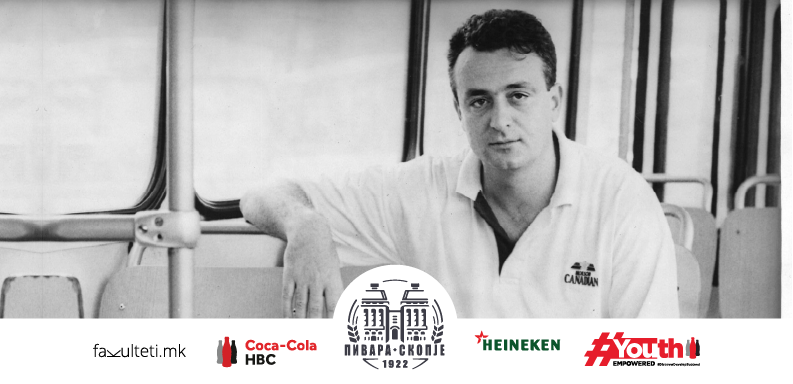
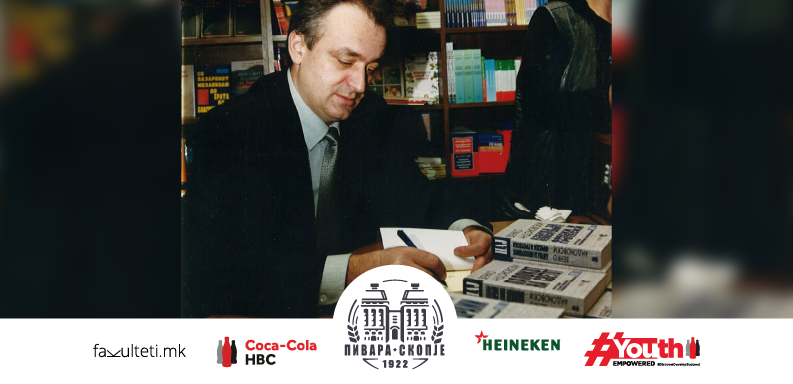
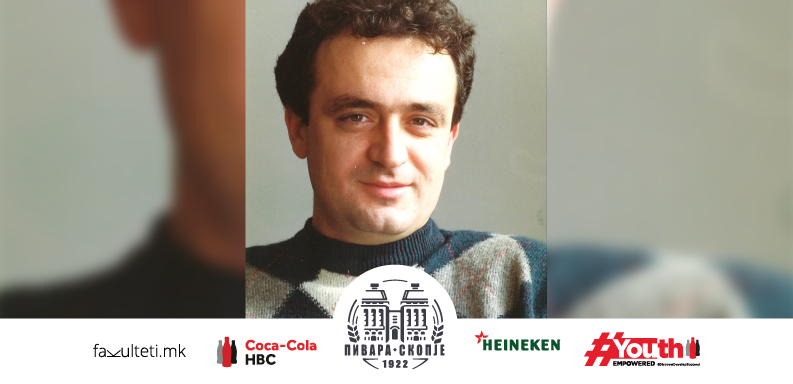
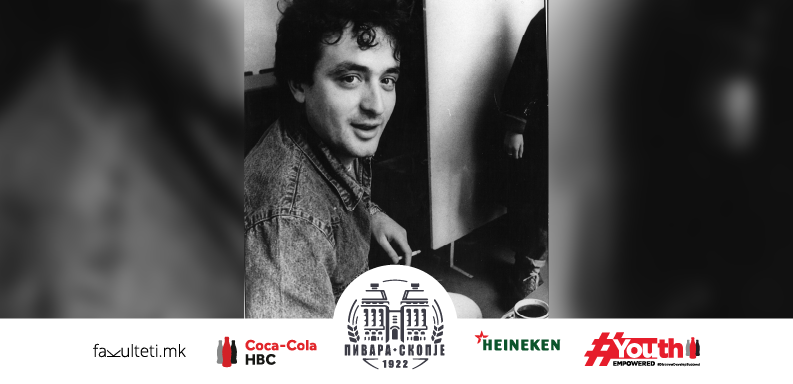
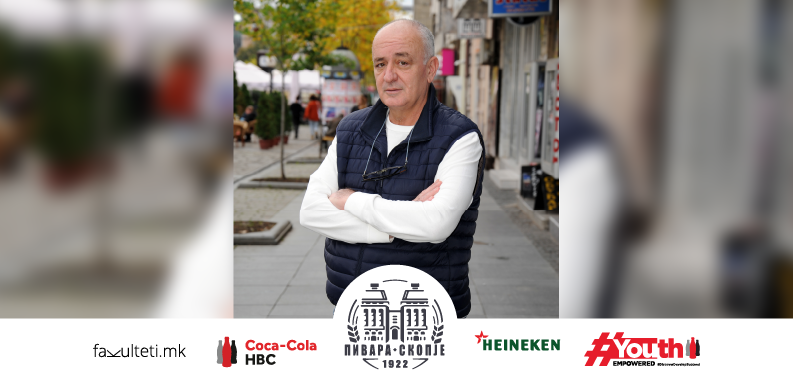
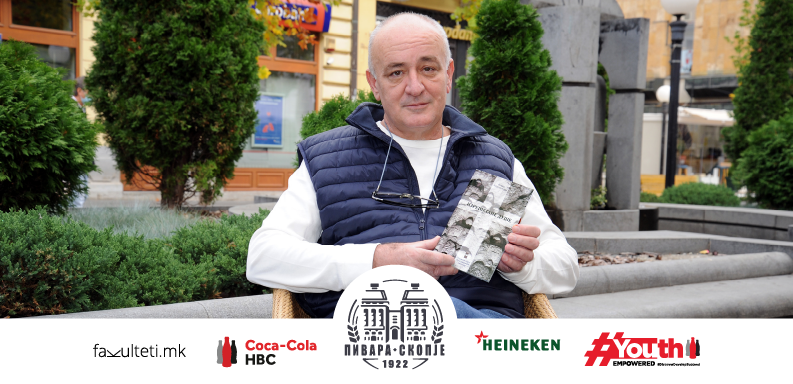
UP THE LADDER OF SUCCESS WITH VENKO ANDONOVSKI: “SINCE HIGH SCHOOL, I’VE BEEN INFECTED BY ELOQUENCE AND HAVEN’T RECOVERED TO THIS DAY”
“If you balance these elements well — melodrama, thriller, philosophy (absurdity), and the perspective from which you view events and the voices through which you narrate them—you will captivate readers.”
Soon to be published is the new book The Opium of Eloquence (Opijatite na leposlovieto) by one of the greatest names on the Macedonian literary scene, author and university professor Venko Andonovski. In it, this remarkable novelist, playwright, storyteller, poet, and critic reveals his “little secrets” of writing. He explains that melodrama (particularly romantic melodrama) is the flour, the thriller is the yeast, absurdity is the meat, and the perspectives and “lens” of narration are the spices in the “recipe” for his literary “specialty”—the novel. He also shares how he maintains the “temperature” of the text. The book will be published by Tri and carries the subtitle My Personal Theory of Literature Without Footnotes (Moja lichna teorija na knizhevnosta bez niedna fusnota).
– “I love this book deeply; it’s my personal ‘prose cookbook,’ and I hope it will help other writers who are searching for themselves—to find themselves—because everyone comes up with their own personal recipe and develops their own style on their own. If you balance these elements well—melodrama, thriller, philosophy (absurdity), and the perspective from which you view events and the voices through which you narrate them — you will captivate readers. For example, even The Navel of Light (Papokot na svetlinata), which many friends (non-writers) told me is ‘too philosophical,’ it is still read—it had five editions (5,000 copies) in just two years,” Andonovski says.
Out of Love, He Wrote his First Poems in High School
The author of remarkable novels like The Navel of the World (Papokot na svetot) – sold in more than 20,000 copies, The Navel of Light (Papokot na svetlinata), The Witch (Veshtica) (18,000 copies), The Mathematician’s Daughter (Kjerkata na matematicharot), as well as of collections of short stories and poetry, and of some of the most popular dramatic texts in Macedonia, fell in love with writing as a high school student when he experienced his first youthful love.
– “Love—what else could be the motivation? When I was in my second year at ‘Orce Nikolov’ High School, I hopelessly fell in love with a girl a year younger than me. I couldn’t sleep at night, and during the day, I wasn’t truly awake—I was in a kind of half-dream state the entire time. There was no feedback. I tried everything to get her to notice me: I even bought a guitar (and that’s when I started playing). I found out the day and time she would take bus number 8 to go to her German classes at the Foreign Language Center. I would get on at the starting station in Vlae (where I lived), hoping she would get on in Karposh 4, so she would at least remember me as ‘the guy with the guitar,’ if not as someone from her school. Nothing worked. So, I sat down, wrote about ten poems, typed them out on my father’s typewriter, bound them into a small book in a single copy, titled it Enigma, and gifted it to her. That’s how my first love ended, but my creative journey began. Later, the poems gained attention in a competition, and as a reward, the City Literary Youth published my first booklet, Enigma, in about 100–200 copies. I was only 16 years old. The booklet is dedicated to ‘the girl with slanted eyes.’ Today, I have only one copy left at home. From that moment on, I was infected with eloquence, and to this day, I haven’t been cured,” Andonovski recalls.
The Poetry of Gane and Ante Was More Valuable Than Einstein’s Theory of Relativity
As a student, Venko Andonovski was an excellent mathematician and physicist, consistently winning first prizes in physics competitions. He seriously debated what to study—mathematics or literature. However, as he explains, the poetry of Ante Popovski, Petre M. Andreevski, Gane Todorovski, Radovan Pavlovski, and Vlada Uroshevic (who he read even back then) was more valuable than Einstein’s work.
– “As I progressed in my knowledge, I realized that mathematics and literature are not so different: mathematics is pure logic, and literature has its own logic. Grammar itself is the mathematics of language. Even today, I write plays based on Aristotle’s rule, which is mathematical and speaks about proportion: I divide the dramatic text into three parts. All characters and elements necessary for the resolution (in the third part) must be introduced in the first part. You cannot introduce new characters in the third part. This is an example of the connection between mathematics and literature. Both are about proportion and symmetry,” Andonovski explains.
Knocking on Professors’ Doors to Offer Himself as an Assistant
After completing his studies in general and comparative literature, and as the top student of his class, Venko Andonovski set out on the day of his graduation to knock on the doors of all the professors who had taught him, asking the same question: “Professor, do you need an assistant?” Unfortunately, all the positions were filled, and after receiving “no” from everyone, he felt disheartened. He decided to work as a journalist and had already become the editor of the cultural section of Student Voice (Studentski zbor). Later, at the Struga Poetry Evenings, he found himself at a table with Professor Atanas Vangelov, who taught at the Department of Macedonian Literature, and Professor Ante Stamakj, who taught literary theory at the Faculty of Philosophy in Zagreb. Vangelov, who had read some of Andonovski’s critiques in Razgledi and was familiar with his two books (poetry and short stories), invited him to join their conversation. After hearing Andonovski’s story, within a month, Vangelov offered him a position as his assistant, a role that Andonovski credits with launching his entire university career. For his master’s thesis, Professor Stamakj served as his mentor. Andonovski then received a state scholarship to pursue postgraduate studies in Zagreb, Croatia, and later became a professor of modern Croatian literature.
– “What young and talented person today has such opportunities and such support from senior colleagues (and from the country) who literally handed me ‘bread’ to sustain myself? No one. Not only have universities collapsed both functionally and structurally, but people have too: humanity within people has also disintegrated. People have become selfish, unjust, unprofessional, and solely focused on themselves,” the professor laments.
Building Personal Relationships with Students
Today, Venko Andonovski holds a doctorate in philological sciences and is a professor at the “Blaže Koneski” Faculty of Philology in Skopje. From his very first day on the job, he has tried to build a relationship of familiarity and mutual respect with his students, addressing them informally rather than maintaining a hierarchical distance. He has never sought to establish his authority through a detached and formal student-teacher approach.
– “There were times when I had to ‘chase’ my students down the hallways, urging them to come to their exams with me, which they were often leaving for last. I would hear responses like, ‘Just a bit longer, professor; I’m still not ready for your exam.’ That warmed my heart: they felt uncomfortable coming to an exam unprepared, which meant I had succeeded in fostering a relationship where they couldn’t lie to a friend. Unfortunately, as time goes by, more and more generations of students fail to embrace this kind of relationship. It’s as if they are afraid or ashamed of closeness. This may be because they arrive at university quite unprepared from high school (it’s evident that secondary education has completely collapsed), and ignorance always blocks and desocializes people. Secondly, the age gap between me and my students is growing, making it easier to establish a ‘paternal’ rather than a friendly relationship. Still, I try to stay close to them. A university should not just be about knowledge—it is, above all, a school of life. You can always read a book you skipped during your studies, but you can never regain the opportunity to personally get to know someone like Gane Todorovski, Atanas Vangelov, or Ferid Muhic. To share a drink with them while discussing philology and philosophy is an experience you can’t replace!”
Creating at Dawn When the Soul Is as Sensitive as a Seismograph
Venko Andonovski is the author of the most-read Macedonian novels of the 21st century, as well as of collections of poetry, short stories, dramatic works, critiques, and cultural studies.
– “I write only in the early morning, from 4:00 to 6:30 AM. During these hours, my associations are the fastest, my thoughts are clear, and my soul is as sensitive as a seismograph to even the slightest emotional tremor. In the evening, I blankly stare at the television, watching either sports or some third-rate movie, because such films are excellent for learning dramaturgy: either they’re flawless (even if they’re low-budget) or utterly terrible, teaching you how not to write. This kind of learning is just as valuable as learning from a work that shows you how things should be done,” Andonovski explains.
In his works, Andonovski strives to convey humane messages about love, meaning, and awareness of what is good.
– “First: Love drives everything—from electrons in atoms to planets and stars in galaxies, including humans and their joy and happiness. Don’t run away from love; have the courage to look for it, it’s around you, even if you don’t see it.
Second: Humans are beings who can survive without food for 15 days, without water for 7 days, but not even a single moment without meaning. If someone loses meaning (even if that meaning is trivial like a betting house), they’ll end their life.
Third: It’s best to seek meaning by choosing good over evil, which means having a clear understanding of what is good and what is bad. Silence in the face of evil will soon lead to celebrating and practicing it. We must choose between good and evil; otherwise, we will stop being human. However, this is increasingly difficult today because evil is skillfully disguised everywhere: in the mass marketing of consumer society that turns you into a dependent materialist; in political organizations, in the dulling of young minds with electronic devices and obsession with artificial intelligence, in pornography, in human trafficking, and in the culture of various dependencies (addictions to fear, money, sex, drugs, alcohol, work, sports, friends, the internet…),” Andonovski warns.
He is convinced that books can fight against evil.
– “If I didn’t believe that, I wouldn’t write. I’m certain that you don’t just read a book; the book reads you. And when it reads you, it underlines the good parts of your soul as important, while crossing out the bad and evil ones—just as you enthusiastically underline wise thoughts you like in a book and cross out (or write in the margins ‘no!’) those that seem horrific, vulgar, or evil. A book ‘formats’ you, to put it in the language of today’s youth,” he concludes.
Works Translated into Foreign Languages Without an Agent or “Facebook”
For Venko Andonovski, literature is a remedy for the soul. “With every written poem, painted picture, or completed novel, the harp of the soul—both for the artist and the audience—is enriched with another string, allowing for even more subtle melodies,” Andonovski explains.
His works have been translated into over ten languages, yet he claims that he has never done anything to secure a translation of any of his works. In fact, he has faced criticism at home for his passive approach. Everything that has been translated was done at the initiative of his friends, fellow writers, and translators from around the world.
– “I don’t have an agent, which is another thing I’ve been criticized for at home. I don’t even have ‘Facebook.’ I don’t think I should concern myself with ‘marketing’ my work abroad. After all, I’m not growing peppers to look for ‘foreign market placement.’ If what I create is good, sooner or later someone will notice it and translate it,” says Andonovski. He adds: “The country’s attitude toward talented writers is appalling. If I, as a mature and established author, am saying that the country hasn’t done anything to represent me in an organized and deliberate way to the world or to facilitate translations of my work, and if it hasn’t done this for any of my other talented colleagues, then what can young writers, who are just starting out and have no opportunities for translation, possibly hope for?”
Andonovski believes that senior writers and the country should work together to systematically and thoughtfully represent young Macedonian talents to the world, advocating for them—if necessary, even through personal connections (if their works deserve it, of course). He emphasizes that every nation actively promotes its cultural talent in this way today. “Without lobbying, there is no cultural progress. The quality of what you lobby for, I repeat, is implied,” Andonovski concludes.
Winner of Many Awards, but the Most Cherished Are Those from Readers
Venko Andonovski finds the greatest joy when one of his novels goes through multiple editions or when theatergoers eagerly seek tickets for a performance based on his text. Among the jury-awarded prizes, his favorite is the most recent one, Tolstoy’s Yasnaya Polyana Award.
– “Before me, this award has been received by remarkable literary figures of global stature, even Nobel laureates, which certainly tickles my vanity… and awakens the hope that I am not hopelessly average as a writer,” Andonovski says.









